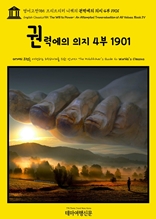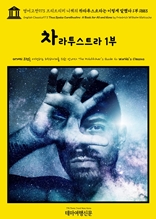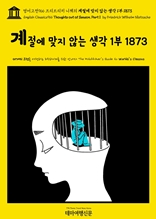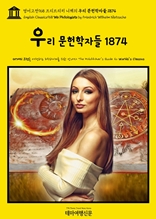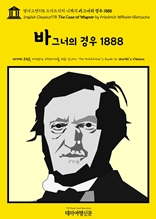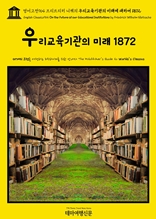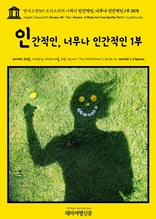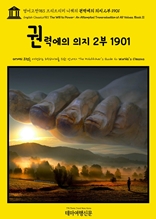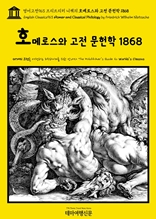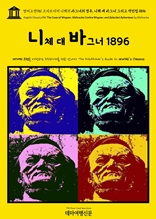영어고전985 프리드리히 니체의 권력에의 의지 4부 1901(English Classics985 The Will to Power: An Attempted Transvaluation of All Values. Book IV)
도서정보 : 프리드리히 니체(Friedrich Wilhelm Nietzsche) | 2023-01-31 | EPUB파일
지원기기 : PC / Android / iOS
▶ 프리드리히 니체의 권력에의 의지 1901(The Will to Power: An Attempted Transvaluation of All Values.)은 프리드리히 니체(Friedrich Wilhelm Nietzsche, 1844~1900)가 1889년 정신병원에 입원한 후 출간된 저서입니다. 그가 병동에 누워 있는 동안 그보다 두 살 어린 여동생 엘리자베트(Therese Elisabeth Alexandra F?rster-Nietzsche, 1846~1935)는 나치의 열렬한 추종자로써 니체의 미발표원고를 취합해 니체 아카이브(Nietzsche Archive, 1894)를 설립하는가 하면, 기존의 작품을 편집해 발간하는 등 탁월한 처세술(?!)을 발휘하였습니다. 심지어 그녀의 장례식장에 아돌프 히틀러(Adolf Hitler, 1889~1945)가 직접 방문하였다는...?!
▷ 니체의 권력에의 의지(The Will to Power)는 아르투어 쇼펜하우어(Arthur Schopenhauer, 1788~1860)가 주장한 살려는 의지(Will to live)에 영향을 받아 탄생하였습니다. 그러나 엘리자베트의 편집으로 인하여 ‘자기 자신을 극복하는 사상 원리’로써 제시된 권력에의 의지(der Wille zur Macht, The Will to Power)란 개념은 니체의 뜻과 무관하게 변용되었고, 아돌프 히틀러가 자신의 권력을 합리화하는 권력의지설(權力意志說)로 활용되며 독일과 온 유럽의 역사에 지대한 영향을 미쳤습니다. 병동에 누워있는 니체가 알면 벌떡 일어날만한 일이 아닐 수 없겠습니다만, 이는 어디까지나 나치 추종자인 엘리자베트에 의해 악용된 것으로 니체에게 친나치주의자이거나 반유대주의자(Antisemitismus)란 오명이 씌여진 원인이 되었습니다. 테마여행신문 TTN Korea 영어고전(English Classics)과 함께 어제도, 오늘도, 내일도 멋진 문학여행을! B
▶ TRANSLATOR'S PREFACE. Unfortunately, The Will to Power was never completed by its author. The text from which this translation was made is a posthumous publication, and it suffers from all the disadvantages that a book must suffer from which has been arranged and ordered by foster hands... It is deeply to be deplored that Nietzsche was never able to complete his life-work... It is to be hoped that we are too sensible nowadays to allow our sensibilities to be shocked by serious and well-meditated criticism, even of the most cherished among our institutions, and an honest and sincere reformer ought no longer to find us prejudiced?to the extent of deafness?against him, more particularly when he comes forward with a gospel?"The Will to Power"?which is, above all, a test of our power to will. ANTHONY M. LUDOVICI.
▷ 번역가의 서문. 불행하게도, 권력에의 의지는 결코 저자에 의해 완성되지 않았습니다. 이 번역본은 사후에 출판된 것입니다. 그리고 책이 겪어야 할 모든 불이익을 겪고 있습니다. 이 책은 수양인의 손에 의해 배열되고 주문되었습니다... 니체가 평생의 일을 끝내지 못했다는 것은 매우 유감스러운 일입니다... 오늘날 우리가 너무 분별력이 있어서, 심지어 우리 기관들 중에서 가장 소중히 여기는 것조차도 진지하고 잘 계획된 비판에 의해 우리의 감성이 충격을 받을 수 있기를 바랍니다. 정직하고 성실한 개혁가는 더 이상 우리가 그에 대해 편견을 가지고 있다는 것을 발견해서는 안 됩니다. 특히 그가 고스피치를 들고 나설 때 말입니다l?"힘에의 의지"?무엇보다도 의지에 대한 우리의 힘을 시험하는 것입니다. 앤서니 M. 루도비치.
▶ 864. Why the weak triumph.?On the whole, the sick and the weak have more sympathy and are more "humane"; the sick and the weak have more intellect, and are more changeable more variegated, more entertaining?more malicious; the sick alone invented malice. (A morbid precocity is often to be observed among rickety, scrofulitic, and tuberculous people.) Esprit: the property of older races; Jews, Frenchmen, Chinese. (The anti-Semites do not forgive the Jews for having both intellect?and money. Anti-Semites?another name for "bungled and botched.")
▷ 864. 약자가 승리하는 이유. 전반적으로 병자와 약자는 더 많은 동정심을 갖고 더 "인간적"입니다. 병들고 약한 사람들은 더 많은 지성을 가지고 있고, 더 변덕스럽고, 더 다양하고, 더 재미있고, 더 악의적입니다. 병자만이 악의를 만들어 냈습니다. (병적 조숙증은 종종 구루병, 음낭염, 결핵 환자에게서 관찰됩니다.) 정신: 나이 든 인종의 속성; 유대인, 프랑스인, 중국인. (반유대주의자들은 유대인들이 지성과 돈을 겸비한 것을 용서하지 않습니다. 반유대주의자는 "엉뚱하고 부실한"의 또 다른 이름입니다.)
▶ 954. A certain question constantly recurs to us; it is perhaps a seductive and evil question; may it be whispered into the ears of those who have a right to such doubtful problems?those strong souls of to-day whose dominion over themselves is unswerving: is it not high time, now that the type "gregarious animal" is developing ever more and more in Europe, to set about rearing, thoroughly, artificially, and consciously, an opposite type, and to attempt to establish the latter's virtues?
▷ 954. 어떤 질문이 끊임없이 우리에게 되풀이됩니다. 그것은 아마도 매혹적이고 사악한 질문일 것입니다. 그러한 의심스러운 문제에 대한 권리를 가진 사람들, 즉 자신에 대한 지배가 흔들리지 않는 오늘날의 강한 영혼의 귀에 속삭이기를 바랍니다. 그리고 유럽에서는 철저하게, 인위적으로, 의식적으로 반대 유형을 양육하고 후자의 미덕을 확립하려고 시도합니까?
▶ And would not the democratic movement itself find for the first time a sort of goal, salvation, and justification, if some one appeared who availed himself of it?so that at last, beside its new and sublime product, slavery (for this must be the end of European democracy), that higher species of ruling and Cæsarian spirits might also be produced, which would stand upon it, hold to it, and would elevate themselves through it? This new race would climb aloft to new and hitherto impossible things, to a broader vision, and to its task on earth.
▷ 그리고 민주주의 운동 자체가 처음으로 일종의 목표, 구원, 정당화를 발견하지 못할 것입니다. 만약 그것을 이용하는 누군가가 나타나서 마침내 새롭고 숭고한 산물 외에 노예 제도가 생겨날 것입니다. 유럽 민주주의의 종말), 더 높은 종의 통치와 제왕의 정신도 생산되어 그 위에 서서 그것을 고수하고 그것을 통해 스스로를 고양시킬 수 있습니까? 이 새로운 종족은 새롭고 지금까지 불가능했던 것들, 더 넓은 비전, 지상에서의 임무를 위해 높이 올라갈 것입니다.
구매가격 : 9,900 원
영어고전973 프리드리히 니체의 차라투스트라는 이렇게 말했다 1부 1883(English Classics973 Thus Spake Zarathustra: A Book for All and None by Friedrich Wilhelm Nietzsche)
도서정보 : 프리드리히 니체(Friedrich Wilhelm Nietzsche) | 2023-01-31 | EPUB파일
지원기기 : PC / Android / iOS
▶ 차라투스트라는 이렇게 말했다 1883(Thus Spake Zarathustra: A Book for All and None by Friedrich Wilhelm Nietzsche)은 프리드리히 니체(Friedrich Wilhelm Nietzsche, 1844~1900)가 1883년부터 1885년 사이에 집필한 철학서이자 철학적 소설(a work of philosophical fiction)입니다. 차라투스트라(Zarathustra)에서 따온 것으로 현재의 이란 북부에서 활동한 예언자이자 조로아스터교의 창시자로, 소설의 주인공이자 실존 인물입니다. 조로아스터교는 종교이자 철학으로써 서구문명에 지대한 영향을 미쳤으며, 니체는 차라투스트라가 정립한 종교 윤리 체계 - 마즈다야스나(Mazdayasna)를 비판함으로써 기독교적 이분법 세계관의 모순을 비판하고자 그의 이름을 빌린 즐거운 학문 1882{The Joyful Wisdom("La Gaya Scienza")}, 차라투스트라는 이렇게 말했다 1883 등을 집필하였습니다. 작가의 의도는 모두를 위한 책이자 아무도 위하지 않는 책(A Book for All and None)란 광오한 부제에서도 짐작하실 수 있을 것입니다.
▷ 크게 제4장으로 구성되어 있으며, 니체 철학을 대표하는 권력에의 의지(Will to power), 기독교에 대한 비판(Criticism of religion), 허무주의(Nihilism)를 비롯해 신은 죽었다(Gott ist tott, 1882), 영원 회귀(永遠回歸, Ewige Wiederkunft, Eternal return, 1885), 위버멘쉬(?bermensch, 1885) 등에 대한 개념적 고찰을 만나실 수 있습니다. 작품의 인기와 함께 니체가 사망한 1900년 스위스 실스 호수(Lake Sils)에 세워진 니체 기념비에 차라투스트라는 이렇게 말했다 1883의 한 구절이 새겨졌으며, 그의 작품에 영감을 받아 리하르트 슈트라우스(Richard Strauss, 1864~1949)의 교향시 Also sprach Zarathustra, Op. 30, 프레더릭 딜리어스(Frederick Delius, 1862~1934)의 오페라 A Mass of Life(1904~1905) 등으로 탄생한 바 있습니다. 테마여행신문 TTN Korea 영어고전(English Classics)과 함께 어제도, 오늘도, 내일도 멋진 문학여행을! B
▶ 제1부, 차라투스트라의 담론(First Part, Zarathustra's Discourses.)에서 주인공 차라투스트라는 동물인 독수리와 뱀과 함께 인간과의 교류 없이 은둔하는 수행자로 등장합니다. 문득 세상을 비추는 태양에게 영감을 얻은 그는 이제 수행을 마무리하고, 속세로 나아가기를 결심합니다. 니체는 그의 목소리를 빌러 위버멘쉬(?bermensch, 1885)에 대한 자신의 주장을 설파합니다. 그의 주장은 전통적인 기독교 도덕(Christian morality)에 반하는 내용으로, 대중들에게는 비난을 받지만, 소수의 제자들이 그를 쫓아 먼 길을 마다하지 않습니다.
▶ I. THE THREE METAMORPHOSES. Three metamorphoses of the spirit do I designate to you: how the spirit becometh a camel, the camel a lion, and the lion at last a child. Many heavy things are there for the spirit, the strong load-bearing spirit in which reverence dwelleth: for the heavy and the heaviest longeth its strength. What is heavy? so asketh the load-bearing spirit; then kneeleth it down like the camel, and wanteth to be well laden. What is the heaviest thing, ye heroes? asketh the load-bearing spirit, that I may take it upon me and rejoice in my strength. ▷ 제1장. 세 가지 변태. 내가 네게 영의 세 가지 변태를 지정하노니, 영이 어떻게 낙타가 되고, 낙타가 사자가 되고, 사자가 마침내 어린아이가 되는가. 많은 무거운 것이 영을 위하여 있고, 그 안에 경외심이 깃드는 강한 짐을 지는 영이 있으니, 무겁고 무거운 것이 그 힘을 사모하기 때문이라. 무거운 것은 무엇입니까? 무거운 짐을 지고 있는 영이 이렇게 묻습니다. 낙타처럼 무릎을 꿇고 짐을 많이 싣기를 원합니다. 너희 영웅들이여, 가장 무거운 것이 무엇인가? 짐을 지는 영에게 구하여 내가 짐을 짊어지고 내 힘으로 즐거워하게 하라.
▶ INTRODUCTION BY MRS FORSTER-NIETZSCHE. HOW ZARATHUSTRA CAME INTO BEING. “Zarathustra” is my brother’s most personal work; it is the history of his most individual experiences, of his friendships, ideals, raptures, bitterest disappointments and sorrows. Above it all, however, there soars, transfiguring it, the image of his greatest hopes and remotest aims. My brother had the figure of Zarathustra in his mind from his very earliest youth: he once told me that even as a child he had dreamt of him. ▷ 미세스 포스터-니체의 소개문. 차라투스트라는 어떻게 탄생하게 되었는가. "차라투스트라"는 내 동생의 가장 개인적인 작품입니다. 그것은 그의 가장 개인적인 경험, 그의 우정, 이상, 환희, 가장 쓰라린 실망과 슬픔의 역사입니다. 그러나 무엇보다도 그의 가장 큰 희망과 가장 먼 목표의 이미지가 솟아 오르고 변형됩니다. 내 형은 아주 어린 시절부터 차라투스트라의 모습을 마음속에 품고 있었습니다.
▶ The notion of rearing the Superman is only a new form of an ideal Nietzsche already had in his youth, that “THE OBJECT OF MANKIND SHOULD LIE IN ITS HIGHEST INDIVIDUALS” (or, as he writes in “Schopenhauer as Educator”: “Mankind ought constantly to be striving to produce great men?this and nothing else is its duty.”) ▷ 초인을 양육한다는 개념은 "인류의 목적은 가장 높은 개인에게 있어야 한다."(또는 그가 "교육자로서의 쇼펜하우어"에서 다음과 같이 썼듯이) 니체가 이미 젊었을 때 가졌던 새로운 형태의 이상적인 것일 뿐입니다. 위대한 사람을 배출하기 위해 끊임없이 노력하는 것, 이것이 의무입니다.”)
▶ People have never asked me, as they should have done, what the name Zarathustra precisely means in my mouth, in the mouth of the first Immoralist; for what distinguishes that philosopher from all others in the past is the very fact that he was exactly the reverse of an immoralist. Zarathustra was the first to see in the struggle between good and evil the essential wheel in the working of things. ▷ 사람들은 제 입에서, 최초의 부도덕주의자의 입에서 차라투스트라라는 이름이 정확히 무엇을 의미하는지 제게 묻지 않았습니다. 그 철학자를 과거의 모든 다른 철학자들과 구별하는 것은 그가 비도덕주의자의 정반대였다는 바로 그 사실입니다. 차라투스트라는 선과 악 사이의 투쟁에서 사물의 작동에 있어 본질적인 바퀴를 본 최초의 사람이었습니다.
구매가격 : 9,900 원
영어고전966 프리드리히 니체의 계절에 맞지 않는 생각 1부 1873(English Classics966 Thoughts out of Season, Part I by Friedrich Wilhelm Nietzsche)
도서정보 : 프리드리히 니체(Friedrich Wilhelm Nietzsche) | 2023-01-31 | EPUB파일
지원기기 : PC / Android / iOS
▶ 프리드리히 니체의 계절에 맞지 않는 생각 1873(Thoughts out of Season by Friedrich Wilhelm Nietzsche) 혹은 유행에 뒤떨어진 관찰과 계절에 맞지 않은 생각(Unfashionable Observations and Thoughts Out of Season)은 프리드리히 니체(Friedrich Wilhelm Nietzsche, 1844~1900)가 1873년부터 1876년 사이에 집필한 네 편의 작품을 묶은 편집본으로 각각의 에세이는 10여 편으로 분절되어 있습니다. 니체의 유고 노트에 따르면, 그는 총 13개의 주제(The Cultural Philistine, History, The Philosopher, The Scholar, Art, The Teacher, Religion, State War Nation, The Press, Natural Science, Folk Society, Commerce, Language)로 에세이를 기획하였으나, 생전에 완성한 것이 바로 본서에 실린 네 작품입니다.
▶ 각각의 원고는 서로 독립된 작품이지만, 크게 유럽의 현대적인 조건(the contemporary condition of European)이란 주제로 포괄할 수 있으며, 특히 독일 문화에 초점이 맞춰져 있습니다. 이후 출간된 다섯 번째 에세이는 우리 문헌학자들 1874(We Philologists by Friedrich Wilhelm Nietzsche)이란 제목으로 별도로 출간되었으며, 함께 읽어시면 더욱 좋습니다. 테마여행신문 TTN Korea 영어고전(English Classics)과 함께 어제도, 오늘도, 내일도 멋진 문학여행을! B
▶ 다비드 슈트라우스, 고백자와 작가(David Strauss, The Confessor And The Writer, 1873)는 독일 자유주의 신학자 다비드 프리드리히 슈트라우스(David Friedrich Strauß, 1808~1874)의 신학에 대한 니체의 날카로운 비평입니다. 다비드는 구신앙과 신신앙: 고백(The Old and the New Faith: A Confession)(1871)이란 충격적인 작품을 통해 예수의 신성성을 부인하는 등 당대의 기독교에 반기를 든 바 있으며, 니체는 이 작품이 사이비 문화의 속물(a Philistine of pseudo-culture)이자 변질된 문화(a degenerate culture)에 경도된 천박한 역사 독해(a vulgar reading of history)라고 비판하였습니다. 더 나아가 슈트라우스 개인을 레싱이나 볼테르와 비견되는데 기쁨을 느끼는 진정한 속물(a genuine Philistine)이자 나쁜 작가(a bad writer)라며 직접적이고 노골적으로 비난하였습니다.
▶ If we have understood Strauss the Confessor correctly, he must be a genuine Philistine, with a narrow, parched soul and scholarly and common-place needs; albeit no one would be more indignant at the title than David Strauss the Writer. He would be quite happy to be regarded as mischievous, bold, malicious, daring; but his ideal of bliss would consist in finding himself compared with either Lessing or Voltaire?because these men were undoubtedly anything but Philistines. ▷ 우리가 참회자 슈트라우스를 올바르게 이해했다면 그는 편협하고 메마른 영혼과 학문적이고 평범한 필요를 가진 진정한 속물임에 틀림없습니다. 작가 다비드 슈트라우스보다 제목에 분개한 사람은 없을 것이다. 그는 짓궂고, 대담하고, 사악하고, 대담하다고 여겨진다면 아주 기뻐할 것입니다. 그러나 그의 행복의 이상은 자신이 레싱이나 볼테르와 비교되는 데 있을 것입니다.
▶ Of course, the blame attaching to Strauss for being a bad writer is greatly mitigated by the fact that it is extremely difficult in Germany to become even a passable or moderately good writer, and that it is more the exception than not, to be a really good one. In this respect the natural soil is wanting, as are also artistic values and the proper method of treating and cultivating oratory. ▷ 물론, 나쁜 작가라는 이유로 슈트라우스를 비난하는 것은 독일에서는 그럭저럭 괜찮거나 적당히 좋은 작가가 되는 것조차 극히 어렵다는 사실과, 정말로 좋은 것. 이런 점에서 자연적인 토양이 부족하고 예술적 가치와 성소를 적절하게 관리하고 가꾸는 방법도 마찬가지입니다.
▶ This latter accomplishment, as the various branches of it, i.e. drawing-room, ecclesiastical and Parliamentary parlance, show, has not yet reached the level of a national style; indeed, it has not yet shown even a tendency to attain to a style at all, and all forms of language in Germany do not yet seem to have passed a certain experimental stage. In view of these facts, the writer of to-day, to some extent, lacks an authoritative standard, and he is in some measure excused if, in the matter of language, he attempts to go ahead of his own accord. ▷ 이 후자의 성취는 그것의 다양한 부문, 즉 응접실, 교회 및 의회 용어가 보여주듯이 아직 국가적 스타일의 수준에 도달하지 못했습니다. 사실, 그것은 아직 스타일에 도달하는 경향조차 전혀 보이지 않았고, 독일의 모든 형태의 언어는 아직 어떤 실험적 단계를 통과하지 못한 것 같습니다. 이러한 사실에 비추어 볼 때 오늘날의 작가는 권위 있는 기준이 어느 정도 결여되어 있으며, 그가 언어 문제에 있어서 자의적으로 앞서가려 한다면 어느 정도는 용인될 수 있습니다.
▶ 바이로이트의 리하르트 바그너(Richard Wagner In Bayreuth, 1876) : 비극의 탄생; 또는 헬레니즘과 염세주의 1872(The Birth of Tragedy; or, Hellenism and Pessimism by Friedrich Wilhelm Nietzsche)에서 그리스 비극의 미학을 독일 작곡가 라히르트 바그너(Richard Wagner, 1813~1883)의 아름다운 오페라를 통해서 만날 수 있다고 주장한 바 있는 니체는 1876년 그의 작품은 물론 그의 삶까지 꼼꼼하게 조사한 평전을 독일 바이로이트에서 집필하였습니다. 바이로이트(Bayreuth)는 독일 바이에른 주 북부에 자리 잡은 작은 도시로 2012년 유네스코 세계유산(UNESCO World Heritage)으로 선정된 마르크그라프 오페라 하우스(Markgr?fliches Opernhaus, Margravial Opera House)가 특히 유명합니다.
▶ For an event to be great, two things must be united?the lofty sentiment of those who accomplish it, and the lofty sentiment of those who witness it. No event is great in itself, even though it be the disappearance of whole constellations, the destruction of several nations, the establishment of vast empires, or the prosecution of wars at the cost of enormous forces: over things of this sort the breath of history blows as if they were flocks of wool. ▷ 위대한 사건이 되기 위해서는 두 가지가 결합되어야 합니다. 그것을 성취하는 사람들의 고상한 감정과 그것을 목격하는 사람들의 고상한 감정입니다. 별자리 전체가 사라지고, 여러 국가가 멸망하고, 광대한 제국이 세워지고, 막대한 힘을 들이고 전쟁을 벌이더라도 그 자체로 위대한 사건은 없습니다. 마치 양털 떼처럼 불었습니다.
구매가격 : 9,900 원
영어고전968 프리드리히 니체의 우리 문헌학자들 1874(English Classics968 We Philologists by Friedrich Wilhelm Nietzsche)
도서정보 : 프리드리히 니체(Friedrich Wilhelm Nietzsche) | 2023-01-31 | EPUB파일
지원기기 : PC / Android / iOS
▶ 우리 문헌학자들 1874(We Philologists by Friedrich Wilhelm Nietzsche)는 프리드리히 니체(Friedrich Wilhelm Nietzsche, 1844~1900)가 총 13개의 주제(The Cultural Philistine, History, The Philosopher, The Scholar, Art, The Teacher, Religion, State War Nation, The Press, Natural Science, Folk Society, Commerce, Language)로 집필한 다섯 번째 원고입니다. 니체는 교수로 재직한 이후 교육에 대해 깊은 관심을 보였고, 기존의 독일 교육 시스템과 교육자에 대한 비판과 고전 문화에 대한 교육법에 대해 다양한 의견을 개진하였습니다. 특히 현재의 세대에게 미치는 현대 기독교(modern Christianity)의 해악을 강도 높게 비판하였으며, 같은 맥락에서 고대 그리스 문화(Greek antiquity)와 알렉산드리아 문화(the Alexandrian culture)에 대해서도 냉소적인 시선을 보냈습니다. 구체적으로 후대 그리스 사상(later Greek thought)이 지나치게 과장된 반편 초기 그리스 사상(early Greek thought)이 과도하게 과소평가되었다고 주장하는 등 고전적 고대(Classical antiquity)의 종교적이고 자유주의적인 원칙(religious and "liberal" principles)이 무비판적으로 전래되고 있다고 지적하였습니다. 테마여행신문 TTN Korea 영어고전(English Classics)과 함께 어제도, 오늘도, 내일도 멋진 문학여행을! B
▶ 프리드리히 니체의 계절에 맞지 않는 생각 1873(Thoughts out of Season by Friedrich Wilhelm Nietzsche) 혹은 유행에 뒤떨어진 관찰과 계절에 맞지 않은 생각(Unfashionable Observations and Thoughts Out of Season)은 프리드리히 니체(Friedrich Wilhelm Nietzsche, 1844~1900)가 1873년부터 1876년 사이에 집필한 네 편의 작품을 묶은 편집본으로 각각의 에세이는 10여 편으로 분절되어 있습니다. 니체의 유고 노트에 따르면, 그는 총 13개의 주제(The Cultural Philistine, History, The Philosopher, The Scholar, Art, The Teacher, Religion, State War Nation, The Press, Natural Science, Folk Society, Commerce, Language)로 에세이를 기획하였으나, 생전에 완성한 것이 바로 본서에 실린 네 작품입니다.
▶ TRANSLATOR'S INTRODUCTION. The subject of education was one to which Nietzsche, especially during his residence in Basel, paid considerable attention, and his insight into it was very much deeper than that of, say, Herbert Spencer or even Johann Friedrich Herbart, the latter of whom has in late years exercised considerable influence in scholastic circles. ▷ 번역가의 서문. 교육의 주제는 니체가 특히 바젤에 거주하는 동안 상당한 관심을 기울인 주제였으며 교육에 대한 그의 통찰력은 허버트 스펜서 또는 요한 프리드리히 허버트보다 훨씬 더 깊었습니다. 말년은 학계에서 상당한 영향력을 행사했습니다.
▶ These scattered aphorisms, indeed, are significant as showing how far Nietzsche had travelled along the road over which humanity had been travelling from remote ages, and how greatly he was imbued with the pagan spirit which he recognised in Goethe and valued in Burckhardt. Even at this early period of his life Nietzsche was convinced that Christianity was the real danger to culture; and not merely modern Christianity, but also the Alexandrian culture, the last gasp of Greek antiquity, which had helped to bring Christianity about. ▷ 이러한 흩어진 격언들은 참으로 인류가 먼 옛날부터 걸어온 길을 따라 니체가 얼마나 멀리까지 왔는지, 괴테에서 인정하고 부르크하르트에서 높이 평가했던 이교적 정신에 얼마나 깊이 젖어 있었는지를 보여준다는 점에서 의의가 있습니다. 니체는 생애 초기에도 기독교가 문화에 대한 진정한 위험이라고 확신했습니다. 현대 기독교뿐만 아니라 기독교를 낳는 데 도움이 된 그리스 고대의 마지막 헐떡임인 알렉산드리아 문화도 마찬가지였습니다.
▶ Classical antiquity, however, was conveyed to the public through university professors and their intellectual offspring, and these professors, influenced (quite unconsciously, of course) by religious and "liberal" principles, presented to their scholars a kind of emasculated antiquity. ▷ 그러나 고전적 고대는 대학 교수들과 그들의 지적 후손들을 통해 대중에게 전달되었고, 이 교수들은 (물론 상당히 무의식적으로) 종교적이고 "자유주의적인" 원칙에 의해 영향을 받아 학자들에게 일종의 무력화된 고대를 제시했습니다.
▶ WE PHILOLOGISTS. I. To what a great extent men are ruled by pure hazard, and how little reason itself enters into the question, is sufficiently shown by observing how few people have any real capacity for their professions and callings, and how many square pegs there are in round holes: happy and well chosen instances are quite exceptional, like happy marriages, and even these latter are not brought about by reason. ▷ 우리 문헌학자들. 제1장. 인간이 순전히 위험에 의해 얼마나 많이 지배되고 있는지, 이성 자체가 문제에 얼마나 적게 들어가는지는 그들의 직업과 소명에 대한 실제 능력을 가진 사람이 얼마나 적은지, 그리고 얼마나 많은 네모난 말뚝이 있는지를 관찰함으로써 충분히 알 수 있습니다. 둥근 구멍: 행복하고 잘 선택된 경우는 행복한 결혼과 같이 매우 예외적이며 후자조차도 이성으로 인해 발생하지 않습니다.
▶ A man chooses his calling before he is fitted to exercise his faculty of choice. He does not know the number of different callings and professions that exist; he does not know himself; and then he wastes his years of activity in this calling, applies all his mind to it, and becomes experienced and practical. When, afterwards, his understanding has become fully developed, it is generally too late to start something new; for wisdom on earth has almost always had something of the weakness of old age and lack of vigour about it. ▷ 사람은 자신이 선택한 능력을 행사하기에 적합해지기 전에 자신의 부름을 선택합니다. 그는 존재하는 다양한 부름과 직업의 수를 알지 못합니다. 그는 자신을 모릅니다. 그런 다음 그는 이 부름에 자신의 활동을 낭비하고 온 마음을 다해 경험이 풍부하고 실용적이 됩니다. 그 후 그의 이해력이 완전히 발달했을 때 일반적으로 새로운 것을 시작하기에는 너무 늦었습니다. 지상의 지혜는 거의 항상 노년의 약점과 활력 부족을 가지고 있기 때문입니다.
구매가격 : 9,900 원
영어고전978 프리드리히 니체의 바그너의 경우 1888(English Classics978 The Case of Wagner by Friedrich Wilhelm Nietzsche)
도서정보 : 프리드리히 니체(Friedrich Wilhelm Nietzsche) | 2023-01-31 | EPUB파일
지원기기 : PC / Android / iOS
▶ 바그너의 경우 1888(The Case of Wagner by Friedrich Wilhelm Nietzsche)은 프리드리히 니체(Friedrich Wilhelm Nietzsche, 1844~1900)가 1888년 출판한 독일 작곡가 리하르트 바그너(ichard Wagner, 1813~1883)에 대한 비평으로, 부제는 음악가의 문제(A Musician's Problem). 니체는 독일 작곡가 라히르트 바그너(Richard Wagner, 1813~1883)의 음악관과 작품을 존경하였고, 청년시절에 집필한 비극의 탄생; 또는 헬레니즘과 염세주의 1872(The Birth of Tragedy; or, Hellenism and Pessimism by Friedrich Wilhelm Nietzsche)를 그에게 헌정하기까지 하였으나, 그가 독일의 민족 운동(V?lkisch movement)과 반유대주의(antisemitism)에 심취한 이후 그와의 결별을 선언한 작품입니다. 니체는 바그너의 음악을 전 유럽에 영향을 미친 허무주의(nihilism)이자 광범위한 질병 현상(symptom of a broader "disease")이라고 표현하였습니다. 테마여행신문 TTN Korea 영어고전(English Classics)과 함께 어제도, 오늘도, 내일도 멋진 문학여행을! B
▶ 볼테르 서거 100주년(1878) 기념 니체 헌정작, 자유로운 영혼을 위한 책(A Book for Free Spirits) 인간적인, 너무나 인간적인 1878(Human, All-Too-Human: A Book for Free Spirits by Nietzsche) : 니체는 독일 작곡가 라히르트 바그너(Richard Wagner, 1813~1883)의 음악관과 작품을 존경하였고, 청년시절에 집필한 비극의 탄생; 또는 헬레니즘과 염세주의 1872(The Birth of Tragedy; or, Hellenism and Pessimism by Friedrich Wilhelm Nietzsche)를 그에게 헌정하기까지 하였습니다만 바그너의 낭만주의 음악(Romantic music)을 계기로 자신만의 사상을 추구하기 시작하였습니다. 인간적인, 너무나 인간적인 1878은 니체가 바그너의 낭만주의적 허무주의를 벗어나 프랑스 계몽철학자 볼테르(Fran?ois-Marie Arouet, 1694~1778)의 자유정신에 매료되기 시작한 분기점이라는 점에서 주목할 가치가 있으며, 볼테르 서거 100주년을 기념해 1878년 헌정한 바 있습니다. 니체의 자유정신에 대한 사상은 5년 후 발표한 차라투스트라는 이렇게 말했다 1883(Thus Spake Zarathustra: A Book for All and None by Friedrich Wilhelm Nietzsche)에서 한층 성숙된 형태로 제시됩니다.
▶ Translator's Preface. Nietzsche's ambition, throughout his life, was to regenerate European culture. In the first period of his relationship with Wagner, he thought that he had found the man who was prepared to lead in this direction. For a long while he regarded his master as the Saviour of Germany, as the innovator and renovator who was going to arrest the decadent current of his time and lead men to a greatness which had died with antiquity. ▷ 번역가 서문. 니체의 평생 야망은 유럽 문화를 재생하는 것이었습니다. 바그너와의 관계 초기에 그는 이러한 방향으로 이끌 준비가 된 사람을 찾았다고 생각했습니다. 오랫동안 그는 그의 주인을 독일의 구세주로, 퇴폐적인 시대의 흐름을 저지하고 사람들을 고대와 함께 사라진 위대함으로 이끌 혁신가이자 혁신가로 여겼습니다.
▶ In Wagner's music, in his doctrine, in his whole concept of art, Nietzsche saw the confirmation, the promotion?aye, even the encouragement, of that decadence and degeneration which is now rampant in Europe; and it is for this reason, although to the end of his life he still loved Wagner, the man and the friend, that we find him, on the very eve of his spiritual death, exhorting us to abjure Wagner the musician and the artist. ▷ 바그너의 음악에서, 그의 교리에서, 그의 예술에 대한 전체 개념에서 니체는 현재 유럽에서 만연하고 있는 퇴폐와 타락의 확증, 촉진, 심지어 격려까지 보았습니다. 그리고 이런 이유로 그는 비록 그의 삶이 끝날 때까지 인간이자 친구인 바그너를 여전히 사랑했지만, 우리는 그가 그의 영적 죽음 직전에 음악가이자 예술가인 바그너를 포기하라고 우리에게 권고하는 것을 발견합니다.
▶ Preface To The Third Edition. That Wagner, too, was a great sufferer, there can be no doubt; not, however, a sufferer from strength, like a true artist, but from weakness?the weakness of his age, which he never overcame. It is for this reason that he should be rather pitied than judged as he is now being judged by his German and English critics, who, with thoroughly neurotic suddenness, have acknowledged their revulsion of feeling a little too harshly. ▷ 제3판 서문. 바그너 역시 큰 고통을 겪었다는 것은 의심의 여지가 없습니다. 그러나 그는 진정한 예술가처럼 강인함이 아니라 약점, 즉 그가 결코 극복하지 못한 나이의 약점으로 고통 받는 사람입니다. 독일과 영국 비평가들에 의해 완전히 신경증적인 갑작스런 감정에 대한 반감이 너무 가혹함을 인정하면서 지금 그를 평가하고 있기 때문에 그가 평가받기보다는 오히려 불쌍히 여겨야 하는 이유입니다.
▶ Preface. I am writing this to relieve my mind. It is not malice alone which makes me praise Bizet at the expense of Wagner in this essay... Nobody, perhaps, had ever been more dangerously involved in Wagnerism, nobody had defended himself more obstinately against it, nobody had ever been so overjoyed at ridding himself of it. A long history!?Shall I give it a name??If I were a moralist, who knows what I might not call it! Perhaps a piece of self-mastery.?But the philosopher does not like the moralist, neither does he like high-falutin' words.… ▷ 머리말. 마음을 달래기 위해 이 글을 씁니다. 내가 이 에세이에서 바그너를 희생시키면서 비제를 찬양하게 만드는 것은 악의만이 아닙니다... 아마도 아무도 바그너주의에 더 위험하게 관여한 적이 없었고, 아무도 그것에 대해 더 완고하게 자신을 방어하지 않았으며, 아무도 자신을 제거합니다. 긴 역사!?이름을 지어줄까요??내가 도덕주의자라면 무엇을 부르지 않을지 누가 알겠습니까! 아마도 자제력의 일부일 것입니다. 그러나 철학자는 도덕주의자를 좋아하지 않으며 고약한 말을 좋아하지도 않습니다.…
구매가격 : 9,900 원
영어고전964 프리드리히 니체의 우리교육기관의 미래에 대하여 1872(English Classics964 On the Future of our Educational Institutions by Friedrich Wilhelm Nietzsche)
도서정보 : 프리드리히 니체(Friedrich Wilhelm Nietzsche) | 2023-01-31 | EPUB파일
지원기기 : PC / Android / iOS
▶ 우리교육기관의 미래에 대하여 1872(On the Future of our Educational Institutions by Friedrich Wilhelm Nietzsche)는 제목 그대로 프리드리히 니체(Friedrich Wilhelm Nietzsche, 1844~1900)가 교육기관의 미래에 대해 집필한 강의안(Lecture)을 묶은 작품으로 1872년 1월부터 3월까지 전달된 다섯 편의 원고로 구성되어 있습니다. 구두 낭독을 위해 작성된 강의안이기 때문에 모든 원고는 신사 숙녀 여러분(Ladies and Gentlemen)이란 상투적인 문구로 시작하며, 청자를 논리적으로, 또한 감정적으로 자극할 수 있도록 생동감 있는 표현과 단순명료한 구성으로 이루어져 있습니다. 테마여행신문 TTN Korea 영어고전(English Classics)과 함께 어제도, 오늘도, 내일도 멋진 문학여행을! B
▶ 원고에 앞서 실린 서문(Preface.)이 특히 인상적인데 작가 니체가 기대하는 독자의 세 가지 특성(The reader from whom I expect something must possess three qualities)에 관한 구체적인 설명은 비단 해당 작품과 상관없이 읽어볼만한 명문입니다. 작가는 강의안에 앞서서 실린 소개(Introduction.)를 통해 해당 작품에 대한 작가의 의도와 목적을 당대 독일의 교육 제도에 근거하여 일목요연하게 설명하였습니다.
▶ PREFACE. The reader from whom I expect something must possess three qualities: he must be calm and must read without haste; he must not be ever interposing his own personality and his own special "culture"; and he must not expect as the ultimate results of his study of these pages that he will be presented with a set of new formulæ. ▷ 서문. 내가 무언가를 기대하는 독자는 세 가지 특성을 가져야 합니다. 그는 침착해야 하고 서두르지 않고 읽어야 합니다. 그는 결코 자신의 개성과 자신의 특별한 "문화"를 방해해서는 안 됩니다. 그리고 그는 이 페이지들에 대한 연구의 궁극적인 결과로서 새로운 공식이 제시될 것이라고 기대해서는 안 됩니다.
▶ This book is intended for calm readers,?for men who have not yet been drawn into the mad headlong rush of our hurry-skurrying age, and who do not experience any idolatrous delight in throwing themselves beneath its chariot-wheels. It is for men, therefore, who are not accustomed to estimate the value of everything according to the amount of time it either saves or wastes. In short, it is for the few. ▷ 이 책은 침착한 독자들을 위한 것입니다. 즉, 우리가 서두르는 시대의 미친 듯이 돌진하는 것에 아직 빠져들지 않았고, 전차 바퀴 아래로 몸을 던지는 우상적인 기쁨을 경험하지 않은 사람들을 위한 것입니다. 그러므로 모든 것의 가치를 그것이 절약하거나 낭비하는 시간의 양에 따라 평가하는 것에 익숙하지 않은 사람들이 있습니다. 간단히 말해서, 그것은 소수를 위한 것입니다.
▶ The third and most important stipulation is, that he should in no case be constantly bringing himself and his own "culture" forward, after the style of most modern men, as the correct standard and measure of all things. We would have him so highly educated that he could even think meanly of his education or despise it altogether. Only thus would he be able to trust entirely to the author's guidance; for it is only by virtue of ignorance and his consciousness of ignorance, that the latter can dare to make himself heard. Finally, the author would wish his reader to be fully alive to the specific character of our present barbarism and of that which distinguishes us, as the barbarians of the nineteenth century, from other barbarians. ▷ 세 번째이자 가장 중요한 조건은 그가 어떤 경우에도 대부분의 현대 남성의 스타일을 따르고 모든 것의 정확한 기준과 척도로서 자신과 자신의 "문화"를 지속적으로 발전시켜서는 안 된다는 것입니다. 우리는 그가 자신의 교육을 비열하게 생각하거나 경멸할 정도로 그를 고등교육을 받게 할 것입니다. 그래야 저자의 안내를 전적으로 믿을 수 있을 것입니다. 오직 무지와 무지에 대한 그의 의식을 통해서만 후자가 감히 자신의 말을 들을 수 있기 때문입니다. 마지막으로, 저자는 독자들이 우리의 현재 야만성과 19세기의 야만인으로서 다른 야만인들과 구별되는 야만성의 구체적인 특징에 완전히 살아있기를 바랄 것입니다.
▶ INTRODUCTION. The title I gave to these lectures ought, like all titles, to have been as definite, as plain, and as significant as possible; now, however, I observe that owing to a certain excess of precision, in its present form it is too short and consequently misleading. My first duty therefore will be to explain the title, together with the object of these lectures, to you, and to apologise for being obliged to do this. ▷ 소개. 제가 이 강의들에 부여한 제목은 모든 제목들과 마찬가지로 가능한 한 명확하고, 명확하고, 중요해야 했습니다. 하지만, 지금 저는 특정한 과도한 정밀도 때문에 현재 형태로는 너무 짧고 결과적으로 오해의 소지가 있다는 것을 관찰합니다. 그러므로 제 첫 번째 의무는 이 강의의 목적과 함께 제목을 당신에게 설명하고, 이것을 해야만 했던 것에 대해 사과하는 것입니다.
▶ My desire?yea, my very first condition, therefore, would be to become united in spirit with those who have not only thought very deeply upon educational problems, but have also the will to promote what they think to be right by all the means in their power. ▷ 제 소망은, 네, 그러므로, 제 가장 첫 번째 조건은 교육 문제에 대해 매우 깊이 생각했을 뿐만 아니라, 그들의 힘에 있는 모든 수단을 통해 옳다고 생각하는 것을 홍보하려는 의지를 가진 사람들과 정신적으로 단결하는 것입니다.
▶ Now it is only in the spirit of the hope above mentioned that I wish to speak of the future of our educational institutions: and this is the second point in regard to which I must tender an apology from the outset. The "prophet" pose is such a presumptuous one that it seems almost ridiculous to deny that I have the intention of adopting it. ▷ 이제 제가 우리 교육 기관의 미래에 대해 말하고 싶은 것은 위에서 언급한 희망의 정신 뿐입니다. 그리고 이것은 제가 처음부터 사과해야 하는 두 번째 요점입니다. "예언자" 포즈는 너무 주제넘은 것이어서 제가 그것을 채택할 의도가 있다는 것을 부인하는 것은 거의 우스꽝스러워 보입니다.
구매가격 : 9,900 원
영어고전969 프리드리히 니체의 인간적인, 너무나 인간적인 1부 1878(English Classics969 Human, All-Too-Human: A Book for Free Spirits, Part 1 by Nietzsche)
도서정보 : 프리드리히 니체(Friedrich Wilhelm Nietzsche) | 2023-01-31 | EPUB파일
지원기기 : PC / Android / iOS
▶ 인간적인, 너무나 인간적인 1878(Human, All-Too-Human: A Book for Free Spirits by Nietzsche)은 프리드리히 니체(Friedrich Wilhelm Nietzsche, 1844~1900)가 1878년, 1879, 1880년에 출간한 여러 작품을 함께 묶어 2권으로 분할 출판한 것으로 전통적인 형이상학과 종교관을 비판하기 위해 집필하였습니다. 짧게는 한 문장부터 짤막한 단편으로 구성되어 있으며, 제1권은 646편, 제2권은 765편이 실려 있습니다. 짤막한 글로 이루어져 있지만, 두 권을 합친 단행본 기준 1,000페이지가 넘는 방대한 작품으로 니체의 작품 중에서도 가장 방대한 철학서로 손꼽힙니다. 테마여행신문 TTN Korea 영어고전(English Classics)과 함께 어제도, 오늘도, 내일도 멋진 문학여행을! B
▶ Translator's Introduction. The publication of Human, all-too-Human extends over the period 1878-1880. Of the two divisions which constitute the Second Part, “Miscellaneous Maxims and Opinions” appeared in 1879, and “The Wanderer and his Shadow” in 1880, Nietzsche being then in his thirty-sixth year. The Preface was added in 1886. The whole book forms Nietzsche's first lengthy contribution to literature. His previous works comprise only the philological treatises, The Birth of Tragedy, and the essays on Strauss, Schopenhauer, and Wagner in Thoughts out of Season. ▷ 번역자 서문. '인간적인, 너무나 인간적인'의 출판은 1878년부터 1880년까지 계속됩니다. 제2부를 구성하는 두 부분 중 "기타 격언과 의견(Miscellaneous Maxims and Opinions)"은 1879년에, "방랑자와 그의 그림자(The Wanderer and his Shadow)"는 1880년에 등장했고, 니체는 36세가 되었습니다. 서문은 1886년에 추가되었습니다. 이 책 전체는 니체의 문학에 대한 첫 번째 장문의 공헌을 형성합니다. 그의 이전 작품들은 단지 철학적 논문인 비극의 탄생과 계절에 맞지 않는 생각 속의 슈트라우스, 쇼펜하우어, 그리고 바그너에 대한 에세이로 구성되어 있습니다.
▶ With the volumes of Human, all-too-Human Nietzsche appears for the first time in his true colours as philosopher. His purely scholarly publications, his essays in literary and musical criticism?especially the essay on Richard Wagner at Bayreuth?had, of course, foreshadowed his work as a thinker. ▷ '인간적인, 너무나 인간적인'이라는 책과 함께 니체는 철학자로서 처음으로 그의 본색으로 등장합니다. 그의 순수하게 학문적인 출판물, 문학과 음악 비평에서의 에세이, 특히 바이로이트의 리하르트 바그너에 대한 에세이는 물론 사상가로서의 그의 작품을 예고했습니다.
▶ 볼테르 서거 100주년(1878) 기념 니체 헌정작, 자유로운 영혼을 위한 책(A Book for Free Spirits) : 니체는 독일 작곡가 라히르트 바그너(Richard Wagner, 1813~1883)의 음악관과 작품을 존경하였고, 청년시절에 집필한 비극의 탄생; 또는 헬레니즘과 염세주의 1872(The Birth of Tragedy; or, Hellenism and Pessimism by Friedrich Wilhelm Nietzsche)를 그에게 헌정하기까지 하였습니다만 바그너의 낭만주의 음악(Romantic music)을 계기로 자신만의 사상을 추구하기 시작하였습니다. 인간적인, 너무나 인간적인 1878은 니체가 바그너의 낭만주의적 허무주의를 벗어나 프랑스 계몽철학자 볼테르(Fran?ois-Marie Arouet, 1694~1778)의 자유정신에 매료되기 시작한 분기점이라는 점에서 주목할 가치가 있으며, 볼테르 서거 100주년을 기념해 1878년 헌정한 바 있습니다. 니체의 자유정신에 대한 사상은 5년 후 발표한 차라투스트라는 이렇게 말했다 1883(Thus Spake Zarathustra: A Book for All and None by Friedrich Wilhelm Nietzsche)에서 한층 성숙된 형태로 제시됩니다.
▶ 니체는 왜 인간, 인간을 노래하였는가? : 니체는 인간적인, 너무나 인간적인 1878을 통해 기존의 종교와 철학이 ‘인간적인 관점에서 바라본’ 사상이라는 점을 공격하였습니다. ‘유일신으로써의 신’에 대한 것이 아니라, ‘전통적인 기독교의 인격적인 신’을 비판함으로써 인간적인 관점에서 소망할 법한 신은 죽었다(Gott ist tott, 1882)란 결론을 도출하였으며, 인간이 이를 깨달음으로써 자기 자신을 오롯이 발견하고 긍정할 수 있다고 주장하였습니다. 이 책의 독자들 또한 기존의 관념을 창조적으로 파괴함으로써 궁극적으로 위버멘쉬(?bermensch, 1885)가 되기를 바라면서…….
▶ FIRST DIVISION. FIRST AND LAST THINGS. 1. Chemistry of Ideas and Sensations.?Philosophical problems adopt in almost all matters the same form of question as they did two thousand years ago; how can anything spring from its opposite? for instance, reason out of unreason, the sentient out of the dead, logic out of unlogic, disinterested contemplation out of covetous willing, life for others out of egoism, truth out of error? Metaphysical philosophy has helped itself over those difficulties hitherto by denying the origin of one thing in another, and assuming a miraculous origin for more highly valued things, immediately out of the kernel and essence of the "thing in itself."
▷ 제1부. 처음이자 마지막 것. 제1장. 관념과 감각의 화학 - 철학적 문제는 거의 모든 문제에서 2,000년 전에 했던 것과 같은 형태의 문제를 채택합니다. 어떻게 그 반대에서 무언가가 나올 수 있습니까? 예를 들어, 비이성에서 나온 추론, 죽은 것에서 나온 의식, 비논리에서 나온 논리, 탐욕스러운 의지에서 나온 사심 없는 사색, 이기심에서 나온 타인을 위한 삶, 오류에서 나온 진리? 형이상학적 철학은 어떤 것의 기원을 다른 것에서 부정하고, "사물 자체"의 핵심과 본질에서 즉시 더 높은 가치를 지닌 사물의 기적적인 기원을 가정함으로써 지금까지 이러한 어려움을 극복하는 데 도움을 주었습니다.
▶ SECOND DIVISION. THE HISTORY OF THE MORAL SENTIMENTS. 35. Advantages of Psychological Observation.?That reflection on the human, all-too-human?or, according to the learned expression, psychological observation?is one of the means by which one may lighten the burden of life, that exercise in this art produces presence of mind in difficult circumstances, in the midst of tiresome surroundings, even that from the most thorny and unpleasant periods of one's own life one may gather maxims and thereby feel a little better: all this was believed, was known in former centuries.
▷ 제2부. 도덕적 감정의 역사. 제35장. 심리학적 관찰의 장점 - 너무 인간적인 인간에 대한 성찰, 또는 학습된 표현에 따르면 심리학적 관찰은 삶의 짐을 가볍게 할 수 있는 수단 중 하나입니다. 예술은 어려운 상황에서, 지루한 환경 속에서 마음의 존재를 만들어냅니다. 심지어 자신의 삶에서 가장 힘들고 불쾌한 시기에 격언을 모아서 기분이 조금 나아질 수 있습니다. 이 모든 것이 믿었고 이전 세기에 알려졌습니다.
구매가격 : 9,900 원
영어고전983 프리드리히 니체의 권력에의 의지 2부 1901(English Classics983 The Will to Power: An Attempted Transvaluation of All Values. Book II)
도서정보 : 프리드리히 니체(Friedrich Wilhelm Nietzsche) | 2023-01-31 | EPUB파일
지원기기 : PC / Android / iOS
▶ 프리드리히 니체의 권력에의 의지 1901(The Will to Power: An Attempted Transvaluation of All Values.)은 프리드리히 니체(Friedrich Wilhelm Nietzsche, 1844~1900)가 1889년 정신병원에 입원한 후 출간된 저서입니다. 그가 병동에 누워 있는 동안 그보다 두 살 어린 여동생 엘리자베트(Therese Elisabeth Alexandra F?rster-Nietzsche, 1846~1935)는 나치의 열렬한 추종자로써 니체의 미발표원고를 취합해 니체 아카이브(Nietzsche Archive, 1894)를 설립하는가 하면, 기존의 작품을 편집해 발간하는 등 탁월한 처세술(?!)을 발휘하였습니다. 심지어 그녀의 장례식장에 아돌프 히틀러(Adolf Hitler, 1889~1945)가 직접 방문하였다는...?!
▷ 니체의 권력에의 의지(The Will to Power)는 아르투어 쇼펜하우어(Arthur Schopenhauer, 1788~1860)가 주장한 살려는 의지(Will to live)에 영향을 받아 탄생하였습니다. 그러나 엘리자베트의 편집으로 인하여 ‘자기 자신을 극복하는 사상 원리’로써 제시된 권력에의 의지(der Wille zur Macht, The Will to Power)란 개념은 니체의 뜻과 무관하게 변용되었고, 아돌프 히틀러가 자신의 권력을 합리화하는 권력의지설(權力意志說)로 활용되며 독일과 온 유럽의 역사에 지대한 영향을 미쳤습니다. 병동에 누워있는 니체가 알면 벌떡 일어날만한 일이 아닐 수 없겠습니다만, 이는 어디까지나 나치 추종자인 엘리자베트에 의해 악용된 것으로 니체에게 친나치주의자이거나 반유대주의자(Antisemitismus)란 오명이 씌여진 원인이 되었습니다. 테마여행신문 TTN Korea 영어고전(English Classics)과 함께 어제도, 오늘도, 내일도 멋진 문학여행을! B
▶ TRANSLATOR'S PREFACE. Unfortunately, The Will to Power was never completed by its author. The text from which this translation was made is a posthumous publication, and it suffers from all the disadvantages that a book must suffer from which has been arranged and ordered by foster hands... It is deeply to be deplored that Nietzsche was never able to complete his life-work... It is to be hoped that we are too sensible nowadays to allow our sensibilities to be shocked by serious and well-meditated criticism, even of the most cherished among our institutions, and an honest and sincere reformer ought no longer to find us prejudiced?to the extent of deafness?against him, more particularly when he comes forward with a gospel?"The Will to Power"?which is, above all, a test of our power to will. ANTHONY M. LUDOVICI.
▷ 번역가의 서문. 불행하게도, 권력에의 의지는 결코 저자에 의해 완성되지 않았습니다. 이 번역본은 사후에 출판된 것입니다. 그리고 책이 겪어야 할 모든 불이익을 겪고 있습니다. 이 책은 수양인의 손에 의해 배열되고 주문되었습니다... 니체가 평생의 일을 끝내지 못했다는 것은 매우 유감스러운 일입니다... 오늘날 우리가 너무 분별력이 있어서, 심지어 우리 기관들 중에서 가장 소중히 여기는 것조차도 진지하고 잘 계획된 비판에 의해 우리의 감성이 충격을 받을 수 있기를 바랍니다. 정직하고 성실한 개혁가는 더 이상 우리가 그에 대해 편견을 가지고 있다는 것을 발견해서는 안 됩니다. 특히 그가 고스피치를 들고 나설 때 말입니다l?"힘에의 의지"?무엇보다도 의지에 대한 우리의 힘을 시험하는 것입니다. 앤서니 M. 루도비치.
▶ All the beauty and sublimity with which we have invested real and imagined things, I will show to be the property and product of man, and this should be his most beautiful apology. Man as a poet, as a thinker, as a god, as love, as power. Oh, the regal liberality with which he has lavished gifts upon things in order to impoverish himself and make himself feel wretched! Hitherto, this has been his greatest disinterestedness, that he admired and worshipped, and knew how to conceal from himself that he it was who had created what he admired.
▷ 우리가 실제에 투자하고 상상한 모든 아름다움과 숭고함, 저는 인간의 재산이자 산물임을 보여줄 것입니다. 그리고 이것이 그의 가장 아름다운 사과가 되어야 합니다. 시인으로서, 사상가로서, 신으로서, 사랑으로서, 권력으로서 인간입니다. 오, 그는 자신을 가난하게 하고 자신을 비참하게 만들기 위해 물건에 선물을 아낌없이 바쳤습니다! 지금까지, 이것은 그가 존경하고 숭배했던 그의 가장 큰 무관심이었고, 그가 존경하는 것을 창조한 것은 그 자신이라는 것을 숨길 줄 알았습니다.
▶ 158. Christianity as an historical reality should not be confounded with that one root which its name recalls. The other roots, from which it has sprung, are by far the more important. It is an unprecedented abuse of names to identify such manifestations of decay and such abortions as the "Christian Church," "Christian belief," and "Christian life," with that Holy Name. What did Christ deny??Everything which to-day is called Christian.
▷ 158. 역사적 실재로서의 기독교를 그 이름이 연상시키는 한 가지 뿌리와 혼동해서는 안 됩니다. 그것의 뿌리가 된 다른 뿌리가 훨씬 더 중요합니다. "기독교 교회", "기독교 신앙", "기독교 생활"과 같은 타락과 낙태의 징후를 그 거룩한 이름으로 동일시하는 것은 전례 없는 이름 남용입니다. 그리스도는 무엇을 부인하셨습니까? 오늘날 기독교인이라고 불리는 모든 것.
▶ 465. Under "Spiritual freedom" I understand something very definite: it is a state in which one is a hundred times superior to philosophers and other disciples of "truth" in one's severity towards one's self, in one's uprightness, in one's courage, and in one's absolute will to say nay even when it is dangerous to say nay. I regard the philosophers that have appeared heretofore as contemptible libertines hiding behind the petticoats of the female "Truth.“
▷ 465. 나는 "영적 자유"에 대해 매우 명확한 것을 이해합니다. 그것은 자신에 대한 엄격함, 올바름, 용기, 아니오라고 말하는 것이 위험할 때에도 아니오라고 말하는 절대적인 의지로. 나는 지금까지 등장한 철학자들을 여성의 "진실"이라는 속치마 뒤에 숨은 경멸할 자유주의자로 간주합니다.
구매가격 : 9,900 원
영어고전963 프리드리히 니체의 호메로스와 고전 문헌학 1868(English Classics963 Homer and Classical Philology by Friedrich Wilhelm Nietzsche)
도서정보 : 프리드리히 니체(Friedrich Wilhelm Nietzsche) | 2023-01-31 | EPUB파일
지원기기 : PC / Android / iOS
▶ 호메로스와 고전 문헌학 1868(Homer and Classical Philology by Friedrich Wilhelm Nietzsche)은 프리드리히 니체(Friedrich Wilhelm Nietzsche, 1844~1900)가 1869년 5월 28일 스위스 바젤 대학교(University of Basel)에 임용되었을 때 발표한 Antrittsvorlesung, 즉 취임 강연을 출판한 작품입니다. 독일 문화권의 대학에서는 취임한 교수가 취임 연설문을 발표하는 것이 관례였으며, 이는 대학교의 임직원과 학생들에게 해당 교수의 업적과 연구 방향을 소개하는 중요한 자리였습니다. 3만9천여 자의 짧은 원고문이지만, 고전 문헌학(Classical Philology)을 연구하는 ‘학자 니체’의 호메로스에 대한 견해를 엿볼 수 있는 중요한 작품으로, 그는 일리아스(The Iliad by Homer)와 오디세이아(The Odyssey by Homer) 등 서구 문학사의 걸작을 집대성한 호메로스(Homer)가 작가 개인이라기보다는, 당대 활동한 수많은 창작자들의 집합이라는 파격적인 주장을 하였습니다.
▶ 니체가 바젤 대학교에 임용된 1869년은 그가 철학자로써 명성을 떨친 대표작 - 비극의 탄생; 또는 헬레니즘과 염세주의 1872(The Birth of Tragedy; or, Hellenism and Pessimism), 차라투스트라는 이렇게 말했다 1883(Thus Spake Zarathustra: A Book for All and None), 선악의 저편 1886(Beyond Good and Evil) 등을 발표하기 전인 젊고 전도유망한 20대의 청년 학자였다는 점을 감안한다면 연설문의 파격적인 내용이 좀 더 충격적으로 다가올 것입니다. 니체는 바젤 대학교에 1869년 불과 24세의 어린 나이에 고전 문헌학(Classical Philology) 교수로 임용된 후 1879년까지 십여 년간 재직하며, 교내는 물론 스위스를 왕래하는 저명인사들과 두루 교류하였습니다. 테마여행신문 TTN Korea 영어고전(English Classics)과 함께 어제도, 오늘도, 내일도 멋진 문학여행을! B
▶ Hellenism is looked upon as a superseded and hence very insignificant point of view. Against these enemies, we philologists must always count upon the assistance of artists and men of artistic minds; for they alone can judge how the sword of barbarism sweeps over the head of every one who loses sight of the unutterable simplicity and noble dignity of the Hellene; and how no progress in commerce or technical industries, however brilliant, no school regulations, no political education of the masses, however widespread and complete, can protect us from the curse of ridiculous and barbaric offences against good taste, or from annihilation by the Gorgon head of the classicist. ▷ 헬레니즘은 대체되고 따라서 매우 중요하지 않은 관점으로 간주됩니다. 이러한 적들에 맞서 우리 문헌학자들은 항상 예술가들과 예술적인 정신을 가진 사람들의 도움에 의존해야 합니다. 헬라인의 형언할 수 없는 단순함과 고상한 위엄을 보지 못하는 모든 사람의 머리 위로 야만의 칼이 어떻게 휘두르는지 판단할 수 있는 것은 오직 그들 뿐입니다. 그리고 상업이나 기술 산업의 어떠한 진보도, 아무리 눈부신 학교 규정도, 대중에 대한 어떠한 정치 교육도, 아무리 광범위하고 완전하더라도, 좋은 취향에 대한 우스꽝스럽고 야만적인 범죄의 저주나 고전주의자의 고르곤 머리에 의한 절멸로부터 우리를 보호할 수는 없습니다.
▶ Life is worth living, says art, the beautiful temptress; life is worth knowing, says science. ▷ 아름다운 유혹자인 예술은 삶은 살 가치가 있다고 말합니다. 과학은 삶은 알 가치가 있다고 말합니다.
▶ Are there characteristic differences between the utterances of the man of genius and the poetical soul of the people? ▷ 천재의 말과 사람들의 시적 영혼 사이에 특징적인 차이가 있습니까?
▶ Let it be noted that the insight into the most diverse operations of the instinctive and the conscious changes the position of the Homeric problem; and in my opinion throws light upon it. ▷ 본능과 의식의 가장 다양한 작동에 대한 통찰력이 호메로스 문제의 위치를 변화시킨다는 것을 주목하십시오. 그리고 제 생각에는 그것에 빛을 던집니다.
▶ 호메로스는 과연 실존 인물인가?! : 현대까지도 호메로스란 작가 개인에 대해서는 출생지, 출생연도, 이력 등이 명확하게 밝혀지지 않았습니다. 더 나아가 일리아스(The Iliad by Homer)와 오디세이아(The Odyssey by Homer)가 과연 같은 저자의 작품인지에 대한 의견도 분분하죠. 호메로스가 맹인이라는 오래된 속설부터 그가 실제 작가가 아니라 그의 구술을 제자나 조수가 받아 적은 것이라는 둥 작품과 작가에 대한 다양한 의혹이 있습니다. 니체가 호메로스를 실존한 천재 개인(a people-genius)이 아니라, 고대 그리스의 전설과 신화를 노래하고 이를 기록한 ‘이름이 잊힌 무수한 창작자들’ - 집단 영혼의 사고(collective soul-thinking)이라고 주장한 것은 바로 이 같은 시대적 상황에 근거한 것입니다.
▶ We believe in a great poet as the author of the Iliad and the Odyssey?but not that Homer was this poet. ▷ 우리는 위대한 시인을 일리아드와 오디세이의 저자로 믿지만, 호메로스가 이 시인이 아니었습니다.
▶ The decision on this point has already been given. The generation that invented those numerous Homeric fables, that poetised the myth of the contest between Homer and Hesiod, and looked upon all the poems of the epic cycle as Homeric, did not feel an æsthetic but a material singularity when it pronounced the name "Homer." This period regards Homer as belonging to the ranks of artists like Orpheus, Eumolpus, Dædalus, and Olympus, the mythical discoverers of a new branch of art, to whom, therefore, all the later fruits which grew from the new branch were thankfully dedicated. ▷ 이 점에 대한 결정은 이미 내려졌습니다. 호메로스와 헤시오도스의 대결 신화를 시화하고 서사시 주기의 모든 시를 호메로스로 바라본 수많은 호메로스 우화를 발명한 세대는 "호메로스"라는 이름을 발음할 때 에스테틱이 아니라 물질적 특이성을 느꼈습니다. 이 시기는 호메로스를 오르페우스, 에우몰포스, 데달루스, 올림포스와 같은 예술가들의 반열에 속한다고 간주합니다. 따라서 새로운 분파에서 자라난 모든 후기의 열매들은 감사하게도 바쳐졌습니다.
▶ And that wonderful genius to whom we owe the Iliad and the Odyssey belongs to this thankful posterity: he, too, sacrificed his name on the altar of the primeval father of the Homeric epic, Homeros. ▷ 그리고 우리가 일리아드와 오디세이에게 빚진 그 놀라운 천재는 이 감사한 후손의 것입니다. 그 역시 호메로스 서사시의 원초적 아버지인 호메로스의 제단에 자신의 이름을 바쳤습니다.
구매가격 : 9,900 원
영어고전981 프리드리히 니체의 바그너의 경우, 니체 대 바그너 그리고 격언집 1896(English Classics981 The Case of Wagner, Nietzsche Contra Wagner, and Selected Aphorisms by Nietzsche)
도서정보 : 프리드리히 니체(Friedrich Wilhelm Nietzsche) | 2023-01-31 | EPUB파일
지원기기 : PC / Android / iOS
▶ 바그너의 경우, 니체 대 바그너 그리고 격언집 1896(The Case of Wagner, Nietzsche Contra Wagner, and Selected Aphorisms by Nietzsche)은 프리드리히 니체(Friedrich Wilhelm Nietzsche, 1844~1900)가 독일 작곡가 리하르트 바그너(Richard Wagner, 1813~1883)에 관해 집필한 두 작품 - 바그너의 경우(The Case of Wagner)와 니체 대 바그너(The Case of Wagner)에 그에 대한 단문(Aphorisms) 76편을 묶은 격언집(Selected Aphorisms)을 더한 합본입니다.
▶ 니체는 독일 작곡가 라히르트 바그너(Richard Wagner, 1813~1883)의 음악관과 작품을 존경하였고, 청년시절에 집필한 비극의 탄생; 또는 헬레니즘과 염세주의 1872(The Birth of Tragedy; or, Hellenism and Pessimism by Friedrich Wilhelm Nietzsche)를 그에게 헌정하기까지 하였습니다만……. 바그너의 낭만주의 음악(Romantic music)과 반유대주의를 계기로 그와의 결별을 선언하였습니다. 바그너의 경우(The Case of Wagner)와 니체 대 바그너(The Case of Wagner)는 바그너에게 실망한 니체의 그에 대한 애증을 엿볼 수 있는 작품으로 이후 니체는 프랑스 계몽철학자 볼테르(Fran?ois-Marie Arouet, 1694~1778)의 자유정신에 매료되어 인간적인, 너무나 인간적인 1878(Human, All-Too-Human: A Book for Free Spirits), 차라투스트라는 이렇게 말했다 1883(Thus Spake Zarathustra: A Book for All and None) 등을 발표합니다. 테마여행신문 TTN Korea 영어고전(English Classics)과 함께 어제도, 오늘도, 내일도 멋진 문학여행을! B
▶ 바그너의 경우 1888(The Case of Wagner by Friedrich Wilhelm Nietzsche)은 프리드리히 니체(Friedrich Wilhelm Nietzsche, 1844~1900)가 1888년 출판한 독일 작곡가 리하르트 바그너(ichard Wagner, 1813~1883)에 대한 비평으로, 부제는 음악가의 문제(A Musician's Problem). 니체는 독일 작곡가 라히르트 바그너(Richard Wagner, 1813~1883)의 음악관과 작품을 존경하였고, 청년시절에 집필한 비극의 탄생; 또는 헬레니즘과 염세주의 1872(The Birth of Tragedy; or, Hellenism and Pessimism by Friedrich Wilhelm Nietzsche)를 그에게 헌정하기까지 하였으나, 그가 독일의 민족 운동(V?lkisch movement)과 반유대주의(antisemitism)에 심취한 이후 그와의 결별을 선언한 작품입니다. 니체는 바그너의 음악을 전 유럽에 영향을 미친 허무주의(nihilism)이자 광범위한 질병 현상(symptom of a broader "disease")이라고 표현하였습니다.
▶ The Case Of Wagner: A Musician's Problem. Preface. I am writing this to relieve my mind. It is not malice alone which makes me praise Bizet at the expense of Wagner in this essay. Amid a good deal of jesting I wish to make one point clear which does not admit of levity. To turn my back on Wagner was for me a piece of fate, to get to like anything else whatever afterwards was for me a triumph. Nobody, perhaps, had ever been more dangerously involved in Wagnerism, nobody had defended himself more obstinately against it, nobody had ever been so overjoyed at ridding himself of it.
▷ 바그너의 경우: 음악가의 문제. 머리말. 마음을 달래기 위해 이 글을 씁니다. 내가 이 에세이에서 바그너를 희생시키면서 비제(Bizet)를 찬양하게 된 것은 악의만이 아닙니다. 많은 농담 가운데 나는 경솔함을 인정하지 않는 한 가지 점을 분명히 하고 싶습니다. 바그너에게 등을 돌리는 것은 나에게 운명의 일부였고, 나중에 무엇이든 좋아하게 되는 것은 나에게 승리였습니다. 바그너주의에 이보다 더 위험하게 관여한 사람은 없었을 것입니다. 바그너주의에 대해 이보다 더 완고하게 자신을 방어한 사람은 없었을 것입니다.
▶ Nietzsche contra Wagner. Wherein I Admire Wagner. I believe that artists very often do not know what they are best able to do. They are much too vain. Their minds are directed to something prouder than merely to appear like little plants, which, with freshness, rareness, and beauty, know how to sprout from their soil with real perfection. The ultimate goodness of their own garden and vineyard is superciliously under-estimated by them, and their love and their insight are not of the same quality.
▷ 니체 대 바그너. 나는 바그너를 존경합니다. 저는 예술가들이 자신이 가장 잘 할 수 있는 것이 무엇인지 모르는 경우가 매우 많다고 생각합니다. 그들은 너무 헛된 것입니다. 그들의 마음은 단지 작은 식물처럼 보이는 것보다 더 자랑스러운 것으로 향하고 있습니다. 이 식물은 신선함과 희소성, 아름다움을 지니고 그들의 토양에서 진정한 완벽함을 가지고 싹을 틔우는 법을 알고 있습니다. 그들 자신의 정원과 포도원의 궁극적인 선함은 그들에 의해 거만할 정도로 과소평가되며 그들의 사랑과 통찰력은 같은 품질이 아닙니다.
▶ Selected Aphorisms from Nietzsche's Retrospect of his Years of Friendship with Wagner.(Summer 1878.) 4. My picture of Wagner, completely surpassed him; I had depicted an ideal monster?one, however, which is perhaps quite capable of kindling the enthusiasm of artists. The real Wagner, Bayreuth as it actually is, was only like a bad, final proof, pulled on inferior paper from the engraving which was my creation. My longing to see real men and their motives, received an extraordinary impetus from this humiliating experience.
▷ 니체의 바그너와의 우정의 해에 대한 회고에서 선택한 격언.(Summer 1878.) 4. 바그너에 대한 내 사진은 그를 완전히 능가했습니다. 나는 이상적인 괴물을 그렸지만 아마도 예술가들의 열정을 불태울 수 있을 것입니다. 진짜 바그너, 바이로이트는 있는 그대로, 내가 만든 조각에서 열등한 종이에 뽑힌 나쁜 최종 증명과 같았습니다. 진짜 남자와 그들의 동기를 보고 싶은 나의 갈망은 이 굴욕적인 경험에서 특별한 자극을 받았습니다.
▶ 48. Wagner does not altogether trust music. He weaves kindred sensations into it in order to lend it the character of greatness. He measures himself on others; he first of all gives his listeners intoxicating drinks in order to lead them into believing that it was the music that intoxicated them. ▷ 48. 바그너는 음악을 전적으로 신뢰하지 않습니다. 그는 그것에 위대함의 성격을 부여하기 위해 비슷한 감각을 그것에 엮습니다. 그는 다른 사람에 대해 자신을 측정합니다. 그는 무엇보다도 듣는 이들에게 취하게 하는 것이 음악이라고 믿게 하기 위해 취하게 하는 음료수를 줍니다.
구매가격 : 9,900 원

